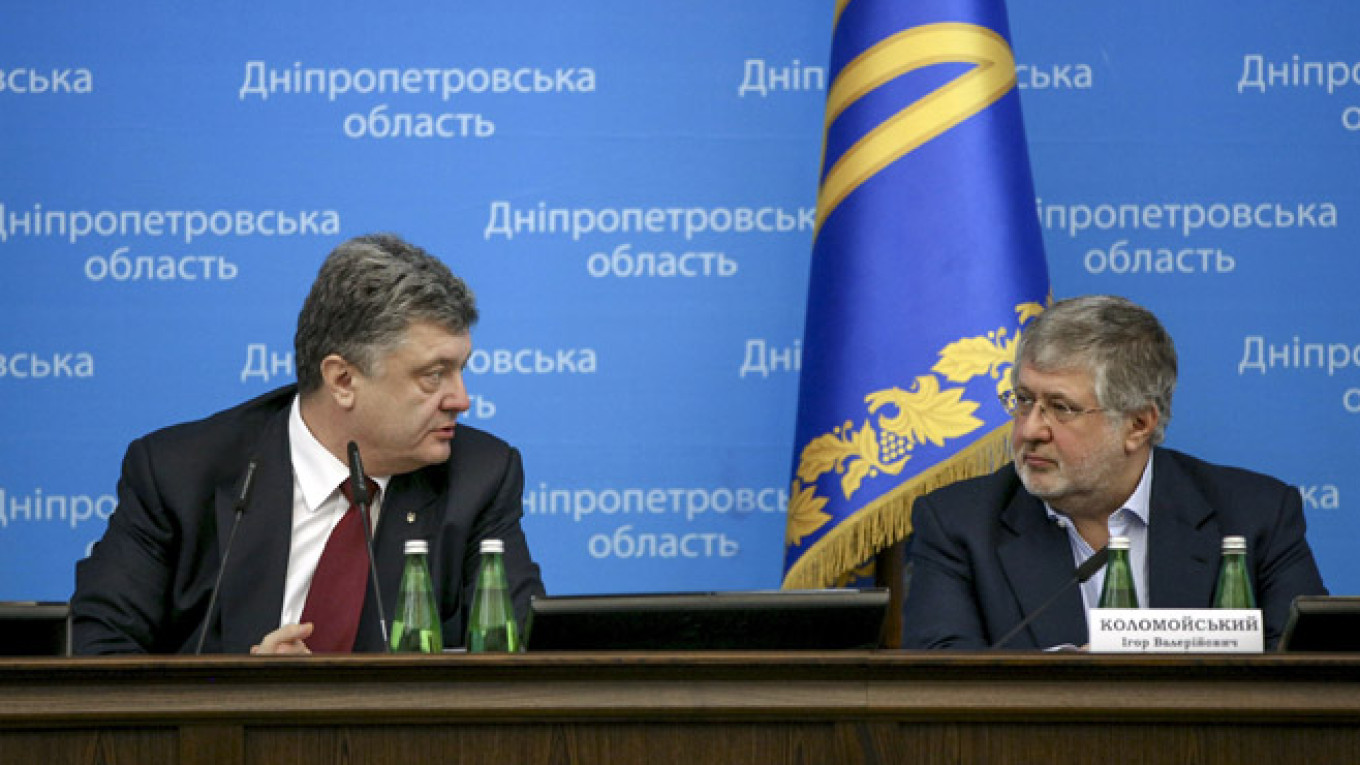The enemies of the Kiev authorities are rejoicing over the latest news out of Ukraine. The administration of Ukrainian President Petro Poroshenko is practically at war with oligarch Ihor Kolomoisky and his private army, with both sides accusing the other of incompetence and corruption.
Kolomoisky was forced to step down as governor of the Dnipropetrovsk region, but that is only the end of one act and not the end of the entire drama. At any moment now, several more corruption scandals could erupt involving government officials from various rival clans.
Kiev's enemies also have reason to celebrate the results of the latest opinion polls. According to a Research & Branding Group survey conducted in early March, only 8 percent of Ukrainians are confident that the country is moving in the right direction, while 48 percent feel that it is moving in the wrong direction and 44 percent have mixed feelings.
Respondents generally do not trust political parties and the authorities, but have strong faith in the church, the army and in civic and voluntary organizations. Poroshenko and Ukrainian Prime Minister Arseniy Yatsenyuk hold negative popularity ratings, with only 33 percent approving of Poroshenko versus 58 percent disapproving, and 24 percent supporting Yatsenyuk and 68 percent unhappy with his job performance.
Kolomoisky played a major role in defending Ukraine's southern and eastern regions. First, he created volunteer battalions with the assistance of the Dnipropetrovsk Regional Administration. Second, by transferring sound business practices to the processes of government, Kolomoisky demonstrated how effectively and efficiently regional officials could carry out their duties. Why did such services go unappreciated?
There are several reasons. For his part, Kolomoisky was greedy and unwilling to accept the new rules of the game that prohibit government officials from using their posts to further private business interests. As for Poroshenko, he failed to clearly articulate his policy objectives and was unwilling to apply those new rules of the game across the board to all oligarchs and senior government officials.
The conflict over state-controlled companies Ukrnafta, in which Kolomoisky holds a 42 percent share, and UkrTransNafta, which is 100 percent state-owned but which Kolomoisky manages, was accompanied by the appearance of a group of armed men in the center of Kiev.
Government authorities do not understand by what supposed right those men appeared, but they have responded by deciding to disarm all private security companies. At the same time, Kolomoisky does not understand why the authorities have decided to start placing harsher limits first on him — after he has done so much for the country — rather than on other powerful oligarchs.
Now Kolomoisky can exploit all of Poroshenko's mistakes and the widespread frustration with him over unpopular government reforms. Kolomoisky has many supporters, and either he or a hand-picked protege could become a serious contender for the presidential post if Poroshenko is forced into early retirement.
The cunning Kolomoisky even tipped his hat in the direction of Moscow by suggesting in a recent television interview that Kiev should negotiate directly with the self-proclaimed people's republics of Donestk and Luhansk — something the Ukrainian authorities have refused to do on principle until now.
The greatest risk that Kolomoisky faces is losing his ability to continue earning money from state companies and the possible bankrupting of the PrivatBank chain, an institution he co-founded and Ukraine's largest bank.
For his part, Poroshenko risks bankrupting his support from civil society that now decides all, or almost all, of Ukraine's most important questions. That outcome is inevitable if Poroshenko does not apply the same strict measures against businessmen and officials from other clans, including his own, that he is now pressing against Kolomoisky.
But the greatest risk Ukraine faces is eliminating the "anything goes" rules of the 1990s without creating new rules to replace them.
Ukraine has a rich tradition of businesspeople "seizing" power and conducting state policy in favor of private rather than public interests. It is impossible to halt that practice without sparking a conflict. The only question is what it will lead to — a step backward, or a more transparent government that is accountable to the Ukrainian people.
Boris Grozovsky is an economic observer. This comment originally appeared in Vedomosti.
A Message from The Moscow Times:
Dear readers,
We are facing unprecedented challenges. Russia's Prosecutor General's Office has designated The Moscow Times as an "undesirable" organization, criminalizing our work and putting our staff at risk of prosecution. This follows our earlier unjust labeling as a "foreign agent."
These actions are direct attempts to silence independent journalism in Russia. The authorities claim our work "discredits the decisions of the Russian leadership." We see things differently: we strive to provide accurate, unbiased reporting on Russia.
We, the journalists of The Moscow Times, refuse to be silenced. But to continue our work, we need your help.
Your support, no matter how small, makes a world of difference. If you can, please support us monthly starting from just $2. It's quick to set up, and every contribution makes a significant impact.
By supporting The Moscow Times, you're defending open, independent journalism in the face of repression. Thank you for standing with us.
Remind me later.


